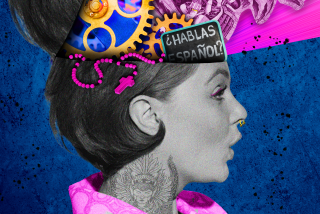Book review: ‘The Return’ by Roberto Bolano
The Return
Stories
Roberto Bolaño
Translated from the Spanish by Chris Andrews
New Directions: 208 pp., $23.95
Roberto Bolaño haunts his English-speaking readership almost twice yearly. Translations of at least 10 books have appeared since his death of liver failure at age 50 in 2003. Many carry dust-jacket claims of being essential to the Bolaño canon — either as the weighty summa of his accomplishment (“2666”) or as a skeleton key that opens up the rest of his works (“Nazi Literature in the Americas”).
Given such an output, the title of Bolaño’s collection of short stories, “The Return,” seems ironic: Did this guy ever leave? As Bolaño rapidly progressed from intriguing rumor (Borges’ heir, now in English!) to posthumous celebrity (Was he really imprisoned by Pinochet?) to required reading, his books haven’t spent a moment off the shelves. “The Return” does serve as a reminder of Bolaño’s legible but scabrous fictional strategies, but perhaps more as a point of entry for the curious: bite-sized Bolaño for beginners. As such, it may be just as essential as his longer, less approachable works.
According to legend — and much of what we know about this author must be regarded as legend — Bolaño focused on writing poetry until the last decade of his life. Then, perhaps by artistic inclination and perhaps by imperatives of fame and finance, he turned to prose, and rapidly churned out the novels, essays and stories that, even now, continue to come out. (At least three books are still slated for release.) Inevitably, he repeated himself, and tropes from his other fiction show up in “The Return”: expatriates, crime, pornography, the political limitations of artists and the author’s insertion of himself into history and his own fiction.
Such repetition might seem lazy, but Bolaño’s accomplishment, and maybe his genius, was to create an internal cosmography that compels readers to pick up his novels and search for different stars in the same constellations. Two or three books into his space, you feel as if you’re holding a thematic object in your hand and considering its previously unseen dimensions. Bolaño’s strengths and weaknesses are oddly complementary: a pincer grasp on readers but a reliance on shock effects; intimate, charismatic narrators whose ruminations exhaust your attention; eclectic, vivid allusions that verge on name-dropping and slander.
The title story here highlights all these traits. “Death caught up with me in a Paris disco at four in the morning,” explains the narrator, a divorced middle manager looking for “the buzz that you get from a certain excess.” After succumbing on the dance floor, he floats outside his body, observing its journey to the morgue, and from there to the home and necrophiliac attentions of one Jean-Claude Villeneuve. More bemused than offended, the spirit chides Villeneuve, then enjoys a chat with him. Bolaño frequently narrates as if bored by depravity; this ghost won’t be caught out of countenance even when watching his own rape.
Oddly, Bolaño’s description of sex with a corpse leaves less of an impression than his portrayal of Villeneuve, “the greatest designer in France.” He’s fictional but seems so much like someone you’ve heard of — scurrilous imaginings of Yves Saint Laurent, maybe — that you’re tempted to Google him to make sure he doesn’t exist. In other stories, these associations are more specific, although in subtly implausible ways. The title character of “Joanna Silvestri” is a European porn actress visiting Los Angeles, where she rekindles an affair with “Jack Holmes,” a retired, ailing star famous for his endowment. Bolaño barely disguises this doppelgänger, and places the story in 1990, two years after the real John Holmes died of AIDS. This imposture is so flimsy it calls attention to itself, but if the device appears cheap, it pulls you in. The effect is like overhearing gossip — you know you shouldn’t believe it, but you listen carefully nonetheless.
Similarly, Bolaño fictionalizes himself with deliberate obviousness. Arturo Belano, familiar to readers as the author’s avatar in “The Savage Detectives,” shows up in “Detectives,” possibly a sketch or dropped chapter from the other book. Here, Bolaño drops his thick, personalized narration and writes in the challenging idiom of George V. Higgins, pushing a narrative entirely through jargon-rich dialogue. Two of Pinochet’s police detectives debate Chilean preferences in weaponry, then remember Belano, “our classmate from high school who was a prisoner.” He stands out to the unnamed detectives because of their shared history, but also because, once in prison, “as he passed the mirror, [Belano] turned suddenly, looked at his face and saw someone else.”
The torrent of titles from Bolaño’s last decade reflect a keening urgency that grabs you even when you think you should know better. The folklore says he knew death was near, and wrote as if every work could be his last; in “The Return,” then, myth and truth might correspond. By the end of the collection, the author has begun to narrate in the first-person, as someone named Roberto Bolaño. “Literature was a vast minefield occupied by enemies,” he writes in “Meeting With Enrique Lihn” (notably, a real Chilean author), “and every day I had to walk through.” The sense of embattlement that animates the writing, and the scab-picking intensity that he brings to his obsessions, makes “The Return” a compelling encapsulation of Bolaño’s work. You might feel conned by the self-conscious artifice, but you won’t be bored.
Singer is a reviewer in Northern California.
More to Read
The biggest entertainment stories
Get our big stories about Hollywood, film, television, music, arts, culture and more right in your inbox as soon as they publish.
You may occasionally receive promotional content from the Los Angeles Times.






